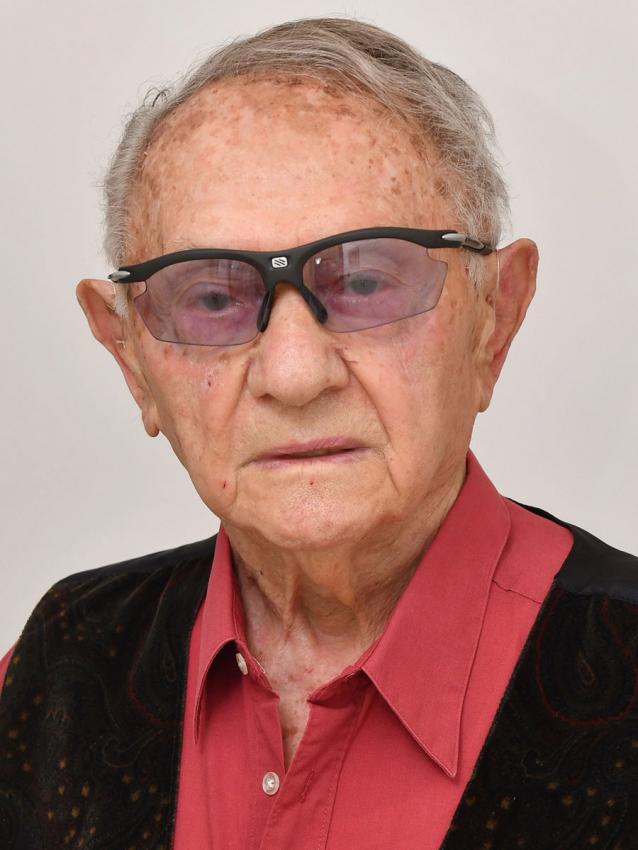Zvi Gill lit one of six torches at the State Opening Ceremony of Holocaust Remembrance Day at Yad Vashem in 2022.
Zvi Glazer (later Gill) was born in 1928 in the city of Zduńska Wola, Poland, to Israel and Ester, wealthy ultra-Orthodox Jews. He had two younger brothers, Arieh-Leib and Shmuel. Alongside traditional Jewish studies, he received a general education.
In the spring of 1940, a ghetto was established in the city. In August 1942, with the liquidation of the ghetto, the Germans conducted a census in the city center. "I stood by my grandpa David," Zvi later recalled. "They took us to the cemetery, where they separated us. My father and brothers were taken to the gas trucks in Chelmno. I did not let go of Grandpa's hand, but a German struck him and we were forced to separate." Zvi's mother was the head nurse at the ghetto's hospital. Knowing that anyone in bed would be killed, she made sure that every patient who could get up, even barely, did so. She then went out wearing her Red Cross hat and walked to the gathering point at the cemetery.
Zvi and his mother were transported in cattle cars to the Lodz ghetto, where Zvi became a member of the Zionist youth movement. "We had underground meetings. We learned about the Land of Israel and sang Zionist songs. A human bubble in the midst of the inferno. When you left that bubble, fantasizing about the Land of Israel with its blue sky, you came across corpses lying on the sidewalks for collection in carts or wheelbarrows." During the Aktionen, his mother hid him behind a closet. She survived the brutal roundups thanks to her profession. "I knew I was going to die," Zvi says. "The question was not if, but when."
"In August 1944, we heard explosions from Red Army cannons. We were hoping for liberation." But the ghetto was liquidated before the Red Army reached Lodz. The surviving Jews, including Zvi and his mother, were deported to Auschwitz. In Auschwitz, Zvi was separated from his mother and transferred to a forced labor camp, where he worked in an aircraft repair factory. From there he was taken to Dachau, and then to another camp in Germany, where he collapsed during forced labor in a heavy snowstorm.
"An older German guard saved my life. He removed the wet clothes from me, dried them, and gave me a slice of bread with jam. I saw Elijah the prophet in the form of a German guard."
Zvi contracted typhus. When he recovered, he was put on a train to an unknown destination. During the journey, air raid sirens sounded, and the guards ordered the prisoners to leave the carriages and lie down on the ground. During one of the alarms, Zvi escaped. The guards chased after him but he managed to slip away.
"I knew they were going to kill me. Every now and then, as I sit with my children, I wonder how I succeeded. It all depended on those two minutes of the escape."
Zvi arrived at the home of a German farmer. He introduced himself as a Pole and worked on the farm in exchange for food and accommodation until liberation.
In 1945, shortly before boarding a ship sailing from Italy to Eretz Israel (Mandatory Palestine), he learned that his mother had survived. She joined him in 1947. Zvi fought in the War of Independence. He later became a writer, a senior journalist with the Israel Broadcasting Authority, and one of the founders of Israeli television. Zvi and Yehudith z"l have three daughters, ten grandchildren and three great-grandchildren.


